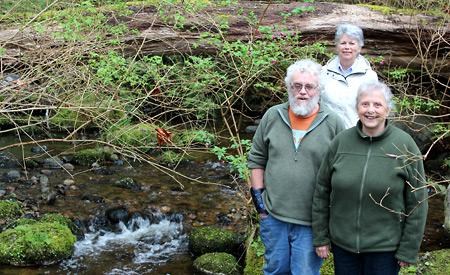Residents in the Stillwater area south of Powell River are celebrating a decision by BC Timber Sales (BCTS) to scale back logging plans in the Jefferd Creek watershed.
BCTS planned to log a 30-hectare cutblock, with about 12 of those hectares located inside the Jefferd Creek watershed, the source of water for about 150 houses.
Recently, BCTS decided to reduce the size of the cutblock inside the watershed to 1.5 hectares and not to build any roads in it as well.
Members of the Committee for the Protection of the Jefferd Creek Watershed and the Stillwater Improvement District, which manages the water system, had been negotiating with BCTS since 2004 about the proposed logging.
Rita Rasmussen, one of the members of the committee, said the group is “very pleased with the decision. I think they have recognized that there is a risk, especially with that cutblock and where they were going to put it.”
The committee received support and funding from West Coast Environmental Law (WCEL). It used the funding to hire a hydrologist to report on whether the logging would impact the water supply. The hydrologist’s report indicated there was a real risk to the water supply because of the amount of debris that could settle in the creek. With increased sedimentation, there is more of a likelihood that pathogens, such as giardia and cryptosporidium, will increase.
From the beginning of the proposed logging, Dan Glover, Vancouver Coastal Health’s drinking water officer in the Powell River region, played a pivotal role in the issue. In 2004, he wrote to BCTS about concerns regarding the potential for “source water to degrade if the proposal were to proceed...which would result in the inability of the Stillwater Improvement District to meet requirements of the Drinking Water Protection Act and the Drinking Water Protection Regulation.”
Glover also wrote in 2007 that, based on an assessment report, the “watershed is highly vulnerable and susceptible to long-term impacts with high related costs.”
In 2009, BCTS informed the committee that road building in preparation for the logging would begin in two weeks. Within a week, the group formally requested Glover to investigate whether the proposed road building and logging amounted to a threat to their drinking water.
Glover agreed to launch an investigation under the Drinking Water Protection Act. BCTS agreed to hold off building roads until Glover’s investigation was finished, which meant there was no need for a formal order to halt logging.
Glover examined the contradictory reports produced by the committee’s and BCTS’ hydrologists and completed his investigation in April 2010.
Glover concluded that it appeared forestry activities would be expected to have an impact on Jefferd Creek. BCTS had attempted to address the identified risks by proposing a series of mitigative measures. “At issue is whether the resulting impact would create ‘acceptable’ or ‘unacceptable’ risks to the water system and consequently to the water consumers,” Glover wrote.
“It has been discussed earlier in this report that Jefferd Creek is unusually sensitive to incremental stresses at this time,” he continued. “Clearly this water supply is already struggling with providing adequate water supply for the community that relies on it, as demonstrated by the current Boil Advisory (the third in a seven-month period) in place at the time of this report. There already exists the potential for intermittent degradation of water quality now and in the future. I do not support compounding this existing risk, and I believe this proposal would place additional stresses on the source water. I therefore conclude that a threat to the Jefferd Creek water supply exists in relation to this proposal.”
BCTS released its revamped logging proposal earlier this year. Glover said BCTS had acted responsibly. “They were very patient,” he said. “At the end of the day, they made a good decision.”
Norm Kemp, a planning forester for BCTS, said the timber sale has been sold recently and there are active operations in the area. The sale was reduced to 12 hectares from the original 30, with only 1.5 hectares in the watershed. “We had been working with the watershed users for quite some time and there was a fair amount of anxiety over our plans,” he said. “The watershed itself has a natural instability and the water quality itself, just naturally without any industrial activities, is prone from time to time to increased sedimentation. There was a concern that if we were to go in there, we would exacerbate that.”
While BCTS felt its plans had a low probability of increasing the risk, Kemp said, it didn’t want to continue to increase the users’ anxiety.
Andrew Gage, a WCEL staff lawyer, has written a blog about the issue. He pointed out while the Drinking Water Protection Act doesn’t provide blanket legal protection for water sources, it does create the position of the drinking water protection officer and gives officers powers to investigate threats to drinking water. “The residents of Stillwater were fortunate to have a courageous drinking water protection officer who acted on their request,” Gage wrote. “They also hired a hydrologist and assembled the evidence to show that in their watershed, at least, logging did pose a real threat to water. Also, BCTS, again to its credit, took the investigation seriously, and did not push ahead with its logging.”
What’s unusual about the story is that the community won, Gage told the Peak. “To have this type of scale down is significant,” he said. “It’s relatively unusual that the risk to drinking water is recognized as a reason to constrain logging to this degree.”
Gage also said, “One would hope that the law would automatically protect drinking water resources, but it doesn’t always. In cases where the risk to drinking water is not acceptable to the community, they need to talk about that and they need to press the government on that.”
Interested readers can find Gage’s blog by following the link online.



